How Do Jackpot Mechanics Drive Player Retention in Slot Games?
Key Takeaways
- Progressive jackpots create anticipation and sustained engagement
- Multiple reward tiers appeal to different player motivations
- Near-miss experiences trigger dopamine responses that encourage continued play
- Social proof through visible jackpot winners strengthens player commitment
Jackpot mechanics in slot machines leverage both psychological triggers and reward systems to maintain player engagement. These carefully designed systems tap into fundamental human behaviors through multiple complementary mechanisms:
Progressive Jackpot Psychology
- Growing prize pools create mounting excitement
- Visible jackpot counters reinforce potential rewards
- Players develop investment mindset as totals increase
- Fear of missing out drives continued participation
Multi-Tier Reward Structure
- Small frequent wins maintain short-term interest
- Medium prizes provide meaningful milestone goals
- Massive jackpots offer life-changing potential
- Varied reward levels appeal to different player types
Near-Miss Experience Design
- Almost-winning moments trigger dopamine release
- Pattern recognition creates anticipation
- Players rationalize continued play after near wins
- Strategic symbol placement heightens excitement
Social Validation Elements
- Winner announcements build credibility
- Success stories create aspirational goals
- Community jackpot events foster competition
- Shared experiences enhance emotional investment
Each of these mechanisms works together to create powerful engagement loops that maintain player interest over extended periods. The layered approach ensures different player motivations are consistently activated through varied psychological triggers and reward structures.
The Psychology Behind Progressive Jackpots
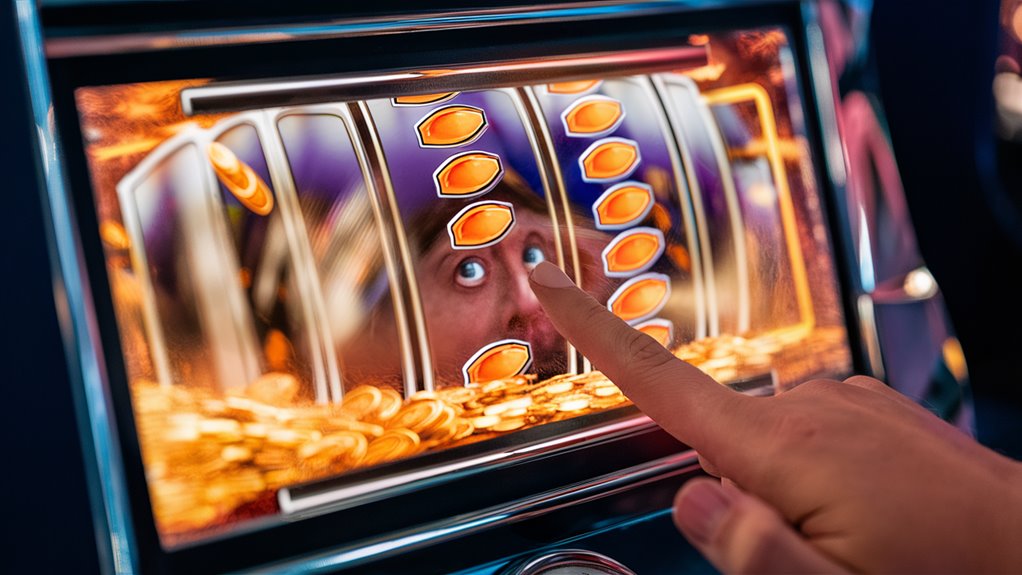
How Do Progressive Jackpots Affect Player Psychology?
Key Takeaways
- Progressive jackpots create urgency through visible, growing prize pools
- Near-miss effects and social proof drive continued engagement
- Psychological reward loops maintain player interest
- Visual and audio cues enhance the gaming experience
Progressive jackpots leverage psychological triggers by combining growing prize pools with social proof, creating a powerful drive for continued play.
The mechanics tap into several core human behaviors that influence player engagement:
The Psychology of Loss Aversion
Players experience a strong urge to participate when watching jackpot amounts climb higher.
This ties directly to loss aversion – the fear of missing out on potentially life-changing rewards.
The visible counter displaying increasing amounts serves as a constant reminder of the opportunity cost of not playing.
Near-Miss Effects and Reward Loops
The near-miss phenomenon plays a crucial role in maintaining player engagement.
When others win or come close to winning, it reinforces the belief in personal victory potential.
Each spin triggers dopamine release through:
- Anticipation of possible wins
- Strategic use of visual effects
- Carefully timed audio cues
- Progressive reward structures
Social Proof and Community Impact
The social aspects of progressive jackpots create additional psychological hooks:
- Public displays of recent winners
- Broadcast announcements of major wins
- Community celebration of victories
- Shared experiences among players
This social component helps players visualize personal success scenarios and maintains engagement through group psychology.
The combination of visible prizes, near-miss experiences, and social proof creates a compelling psychological framework that keeps players invested in the progressive jackpot system.
Variable Reward Schedules
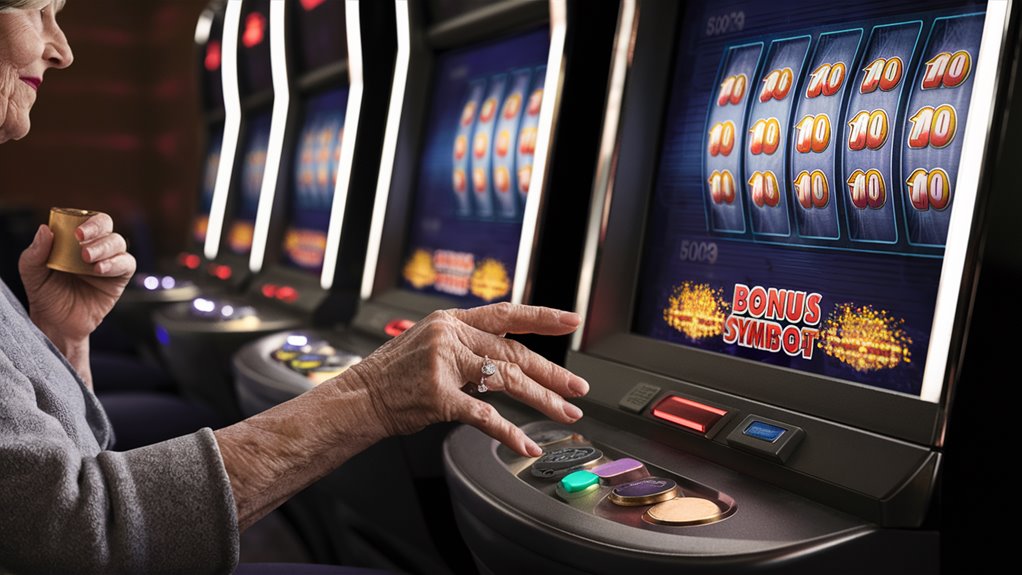
How Do Variable Reward Schedules Keep Players Engaged?
Key Takeaways:
- Variable reward schedules use unpredictable payouts to maintain player engagement
- Multiple reward tiers create layered anticipation and reinforcement
- Near-miss experiences trigger dopamine responses similar to actual wins
- Randomized rewards prove more effective than fixed schedules
Understanding the Psychology of Variable Rewards
Variable reward schedules in slot machines leverage B.F. Skinner's operant conditioning principles to create compelling player experiences.
Unlike fixed rewards, these unpredictable patterns keep players engaged through uncertainty and anticipation.
The Power of Multiple Reward Tiers
Slot machines implement three distinct reward levels:
- Small, frequent wins
- Medium, occasional payouts
- Rare, large jackpots
Each tier operates independently on variable schedules, creating multiple engagement layers that maintain player interest throughout gaming sessions.
The Near-Miss Effect
Near-miss experiences play a crucial role in player retention.
When players almost hit jackpots, their brains release dopamine similarly to actual wins.
This neurological response reinforces continued play, even without monetary rewards.
Why Unpredictability Works
Fixed reward schedules would allow players to predict winning times, limiting engagement to specific moments.
Variable schedules create constant anticipation, making every spin potentially rewarding and maintaining consistent player interest over time.
Near-Miss Effects on Player Behavior
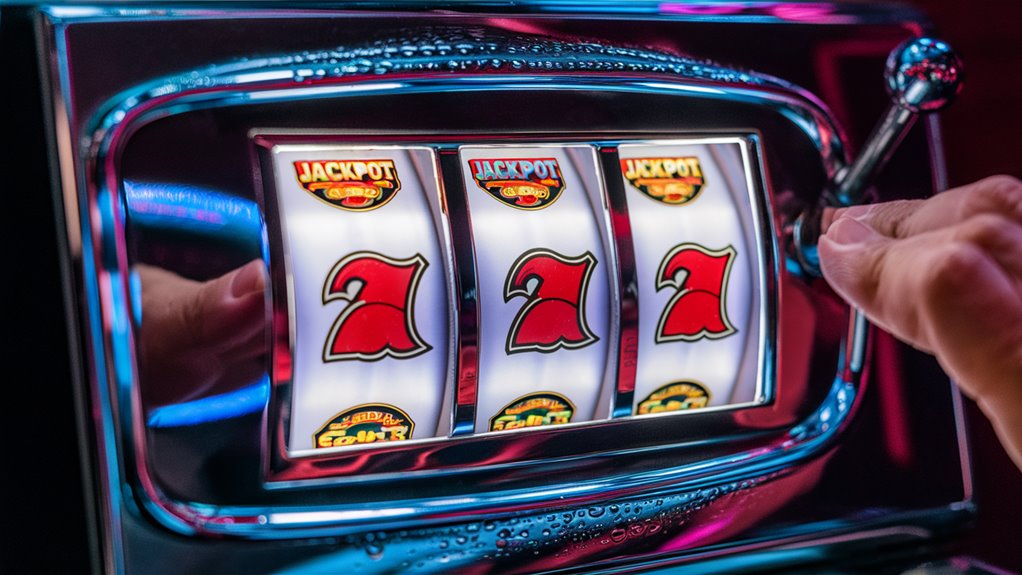
How Do Near-Miss Events Affect Player Psychology in Slot Machines?
Key Takeaways
- Near-miss events trigger dopamine responses similar to actual wins
- Players interpret near-misses as skill development, leading to increased play time
- Optimal near-miss frequency ranges from 12% to 45% of spins for maximum engagement
Understanding the Psychological Impact
Near-miss events in slot machines create distinct psychological effects that significantly influence player behavior.
When slots display two matching jackpot symbols with the third narrowly missing alignment, the brain processes this outcome differently than a complete miss, triggering dopamine release patterns similar to actual wins.
The Science Behind Player Motivation
These near-misses work by exploiting a cognitive distortion where players interpret "almost winning" as developing skill or approaching a win.
This psychological mechanism results in:
- Increased playing duration
- Higher betting frequency
- Enhanced excitement levels
- Stronger motivation to continue gaming
Strategic Design Elements
Game designers implement precise near-miss frequencies to maintain player engagement:
- Too frequent: Players feel manipulated
- Too rare: Insufficient excitement
- Optimal range: 12-45% of spins
This calculated approach keeps players engaged by creating a persistent sensation of being on the verge of a significant win.
The careful balance of near-miss events maintains the game's appeal while maximizing player retention through psychological reinforcement.
Multi-Tiered Jackpot Systems
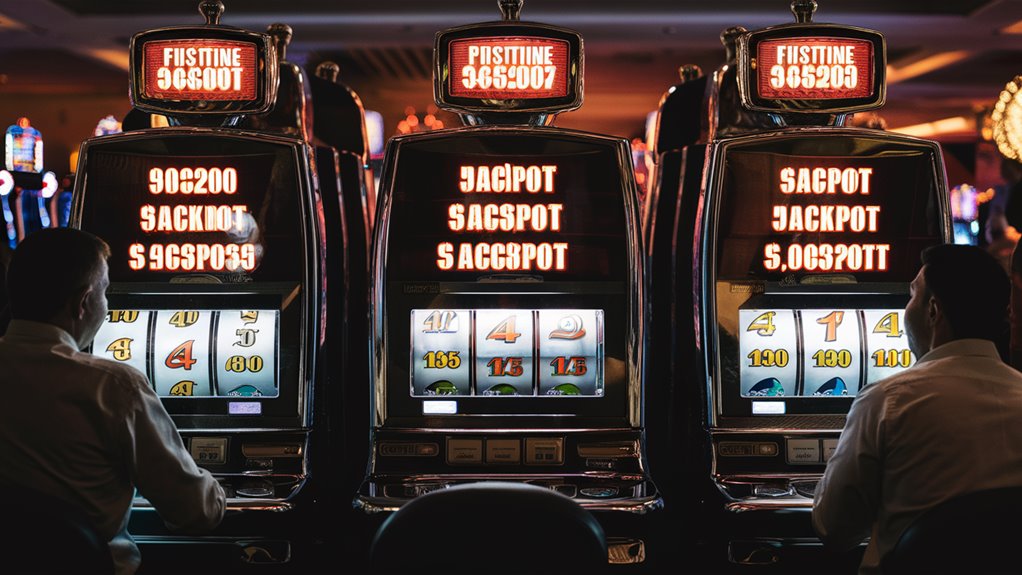
How Do Multi-Tiered Jackpot Systems Work in Modern Slots?
Key Takeaways
- Multi-tiered jackpot systems offer four distinct prize levels: mini, minor, major, and grand
- Progressive mechanics increase jackpot sizes through player contributions
- Different tiers target various player preferences, from casual to high-stakes
Understanding the Tier Structure
Modern slot machines utilize sophisticated multi-tiered jackpot systems that provide players with four distinct prize levels.
These tiers typically include mini, minor, major, and grand jackpots, each designed with specific winning probabilities and prize amounts.
Frequency and Prize Distribution
The frequency of jackpot wins varies significantly by tier:
- Mini jackpots: Multiple times per hour
- Minor jackpots: Several times per hour
- Major jackpots: Few times per day
- Grand jackpots: Once every few months
Progressive Mechanics
The progressive element of multi-tiered systems works through:
- Automatic contribution from each player bet
- Real-time jackpot amount displays
- Continuously growing prize pools
- Separate tracking for each tier level
Player Psychology and Engagement
Multi-tiered jackpot systems maintain player interest through:
- Frequent small wins at lower tiers
- Visible progression of jackpot amounts
- Appeal to different player types
- Balance between accessibility and aspirational prizes
The tiered structure effectively serves both casual players seeking regular small wins and serious gamblers pursuing substantial payouts.
It creates a comprehensive gaming experience that caters to diverse player preferences and betting styles.
Social Proof and Winner Displays
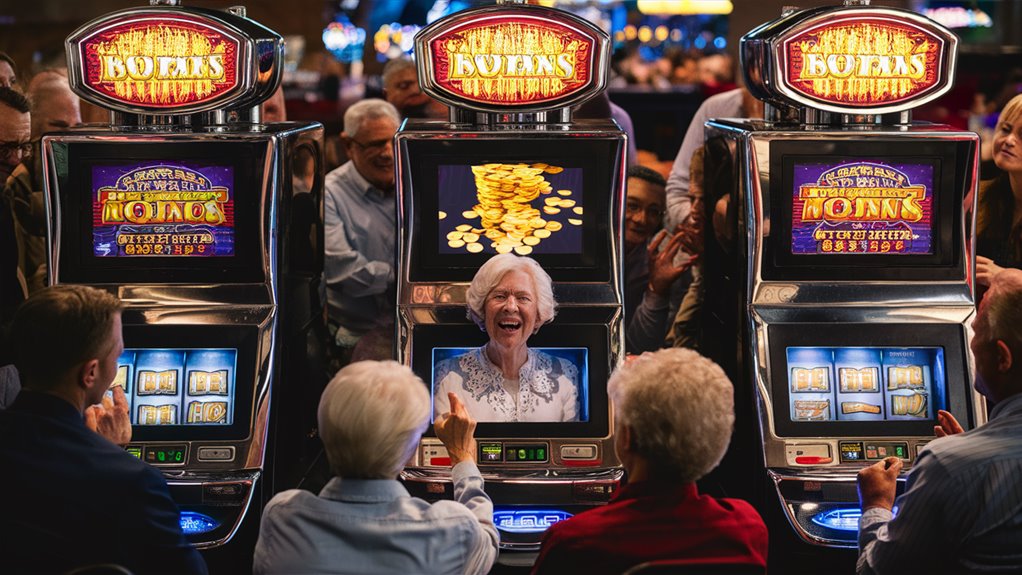
How Do Casinos Use Social Proof to Influence Player Behavior?
Key Takeaways
- Winner displays create psychological triggers that motivate continued play
- Strategic placement of victory celebrations generates excitement and FOMO
- Modern slot machines integrate real-time social proof elements
- Online casinos leverage live feeds and notifications for similar effects
Understanding Casino Winner Displays
Casino slot machines prominently showcase recent jackpot winners and celebrations to demonstrate winning possibilities and create urgency among players.
These displays tap into fundamental psychological drivers like social proof and fear of missing out (FOMO).
Strategic Positioning for Maximum Impact
Casinos carefully position winner displays in high-visibility areas using:
- Scrolling tickers showing recent payouts
- Overhead screens broadcasting major wins
- Strategic sound effects drawing attention to nearby victories
- Carefully calibrated timing to maintain floor excitement
Modern Social Integration Features
Today's slot machines incorporate social proof directly into gameplay through:
- Real-time win statistics displays
- Visible neighboring player bonus rounds
- Mini-celebrations viewable by nearby players
- Community jackpot notifications
- Live winner feeds in online platforms
These social connectivity features transform individual gaming into a more communal experience, validating player participation and maintaining engagement through shared excitement and visible success stories.
Time-Based Jackpot Mechanics
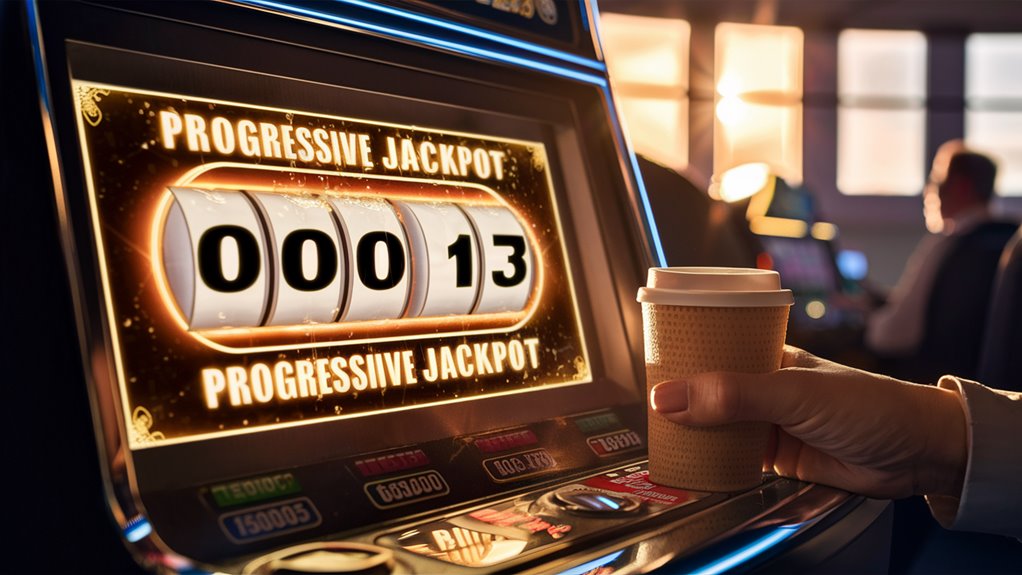
How Do Time-Based Jackpot Mechanics Drive Player Engagement?
Key Takeaways
- Time-based jackpots guarantee payouts within specific timeframes or amount thresholds
- Two main varieties: time-limited and amount-limited jackpots
- Mechanics leverage FOMO and perceived value to increase player retention
- Strategic timing choices enhance player involvement and game participation
Understanding Time-Based Jackpot Systems
Time-based jackpot mechanics create excitement by guaranteeing payouts within predetermined parameters.
These systems use either time limits or monetary thresholds to ensure jackpot drops, making gameplay more predictable and engaging for players.
Types of Time-Based Jackpots
- Time-Limited Jackpots
- Must pay out by specific times
- Creates urgency based on clock countdown
- Encourages regular play sessions
- Amount-Limited Jackpots
- Triggers before reaching set monetary values
- Example: "Must-hit-by" $1000 jackpots
- Drives increased play as amount approaches limit
Psychological Impact on Player Behavior
The mechanics tap into powerful psychological triggers:
- FOMO (Fear of Missing Out) drives continued play
- Players calculate winning odds based on remaining time/amount
- Guaranteed payouts create trust and anticipation
- Strategic timing decisions enhance engagement
Player Strategy and Decision Making
Players often develop strategic approaches:
- Monitoring jackpot progress
- Timing play sessions for maximum probability
- Calculating risk-reward ratios
- Planning gaming sessions around payout windows
These mechanics create a powerful retention tool by combining predictability with guaranteed rewards, maintaining player interest and encouraging regular game participation.
Mystery Prize Psychology

How Do Mystery Prizes Tap Into Player Psychology?
Key Takeaways
- Mystery prizes activate the brain's reward system through uncertainty and anticipation
- Variable ratio reinforcement and information gap theory drive player engagement
- Progressive reveals and near-misses strengthen players' belief in winning
The Psychology Behind Mystery Prizes
Mystery prizes captivate players by leveraging uncertainty and anticipation in our brain's reward system.
Unlike traditional jackpots with fixed odds, mystery prizes create sustained excitement through unpredictable outcomes, making each gaming session uniquely engaging.
Core Psychological Principles
Two fundamental psychological mechanisms make mystery prizes particularly effective:
- Variable Ratio Reinforcement
- Unpredictable reward timing
- More addictive than fixed-reward systems
- Maintains sustained player engagement
- Information Gap Theory
- Creates compelling curiosity through unknown prize amounts
- Drives players to resolve uncertainty
- Builds anticipation throughout gameplay
Progressive Reveal Mechanics
Successful slot games implement strategic progressive reveals in their mystery mechanics:
- Partial clues maintain excitement
- Near-miss experiences reinforce winning possibility
- Guaranteed but unknown prize timing creates persistent engagement
- Players stay active longer compared to traditional jackpot systems
Gaming developers leverage these psychological elements to create compelling experiences that keep players invested in the mystery prize mechanic while maintaining anticipation throughout the gaming session.
